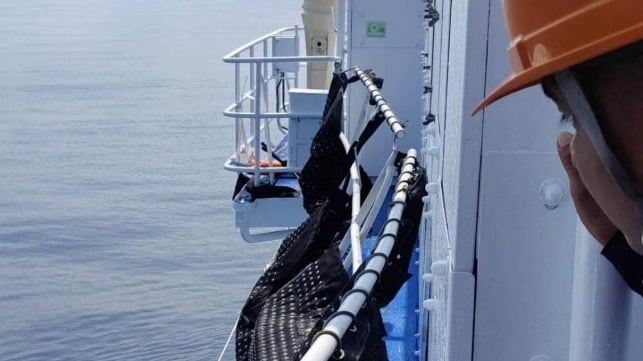Philippines Will Stick to Nonviolence After Chinese Water-Cannon Attacks

The Philippine Coast Guard will not match the China Coast Guard's increasingly aggressive tactics in the South China Sea, a spokesman said Wednesday, and will stick to professional and nonviolent demonstrations of maritime sovereignty.
Over the past two years, the China Coast Guard's rules of engagement in the South China Sea have become increasingly confrontational. Escalatory new tactics include shining powerful target illumination lasers at Philippine vessels; swarming and blocking maneuvers; shouldering; rope barriers; and water-cannoning.
This last tactic has caused damage and injuries. China Coast Guard water cannon attacks have hurt multiple Philippine personnel and caused damage to at least four government vessels. The most recent incident occurred Tuesday, when China Coast Guard cutters water-cannoned two Philippine patrol vessels. The water pressure was far higher than in past attacks, according to spokesman Commodore Jay Tarriela. Damage included bent railings, torn deck canopies, interior flooding, and a broken radar and radome, reporters embedded in the mission said.
Philippine President Ferdinand Marcos Jr. has asked his forces not to respond with their own water cannons, Tarriela said.
“We’re not going to be the reason to escalate the tension. We’re not going to be an excuse for the Chinese government to bring in their warships," he told ABS CBN. "What is the strategic value of the water cannon? Get wet?"
Instead, the Philippines will continue its nonviolent resistance to Chinese pressure by maintaining a presence in Philippine waters.

that matters most
Get the latest maritime news delivered to your inbox daily.
"We will still patrol there, we will still give aid to fishermen, that's our patriotic duty that we are sworn to do. China cannot stop us," Tarriela said.
Under its "nine-dash line" policy, China claims sovereignty over the vast majority of the South China Sea, including waters and land features located hundreds of miles from the Chinese mainland. Most of these areas are within the EEZs of neighboring countries, including the Philippines. In 2016, an international tribunal ruled that China's claims to ownership of Philippine waters were invalid under international law.
